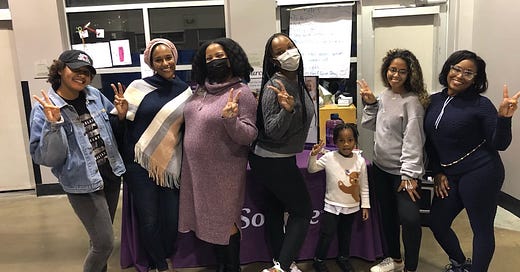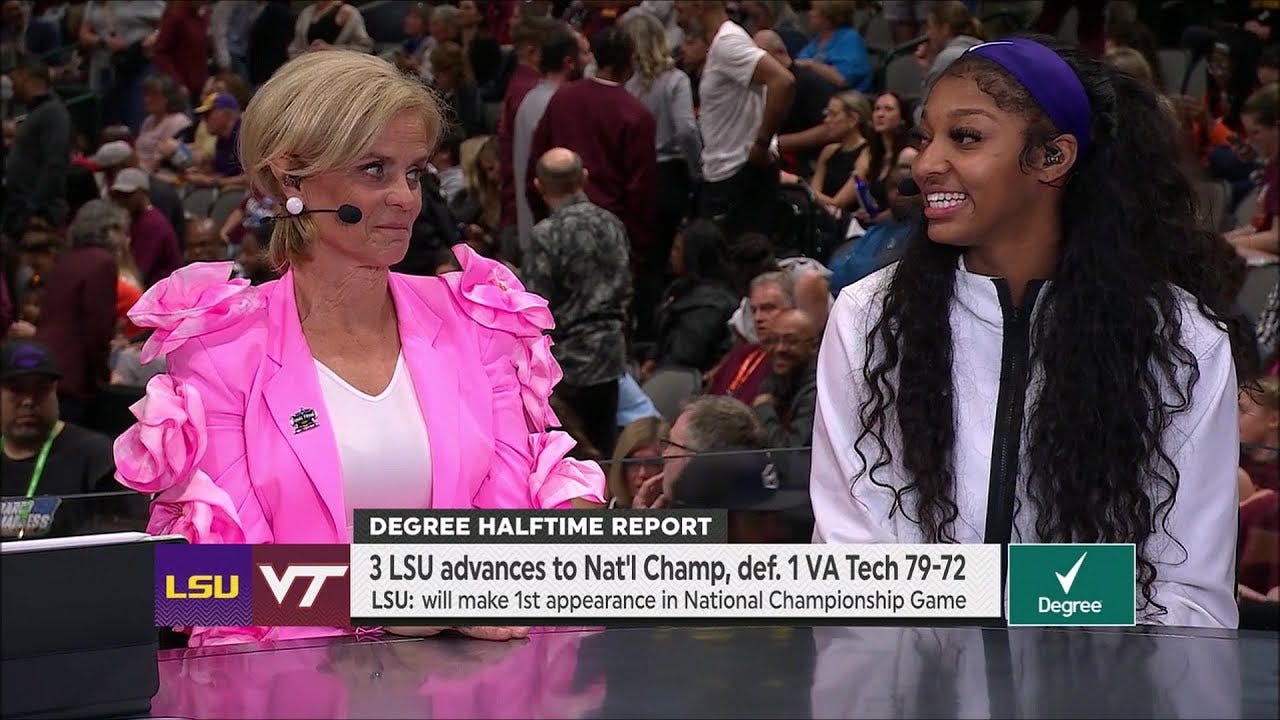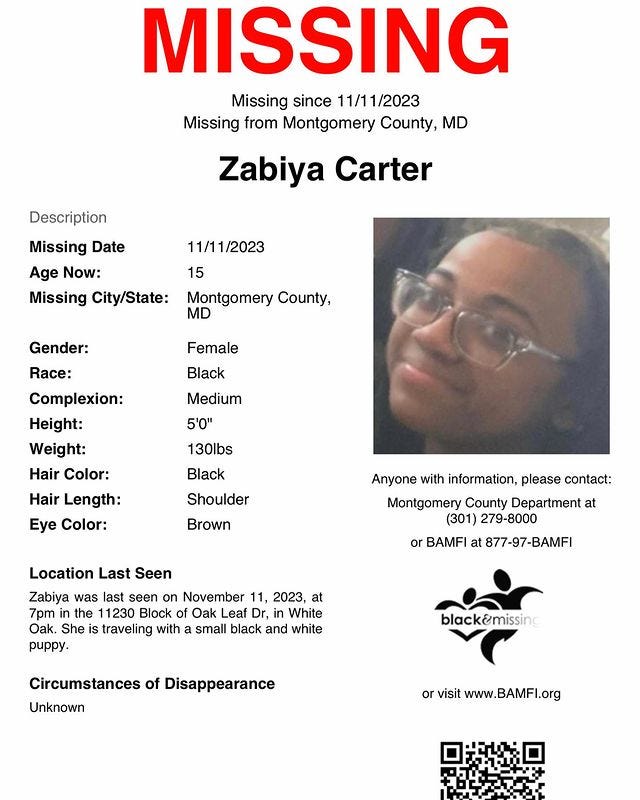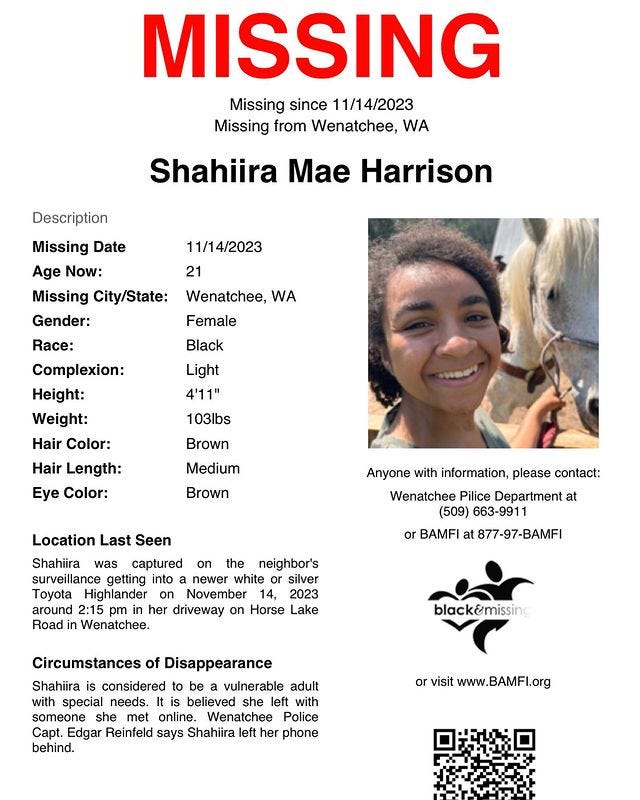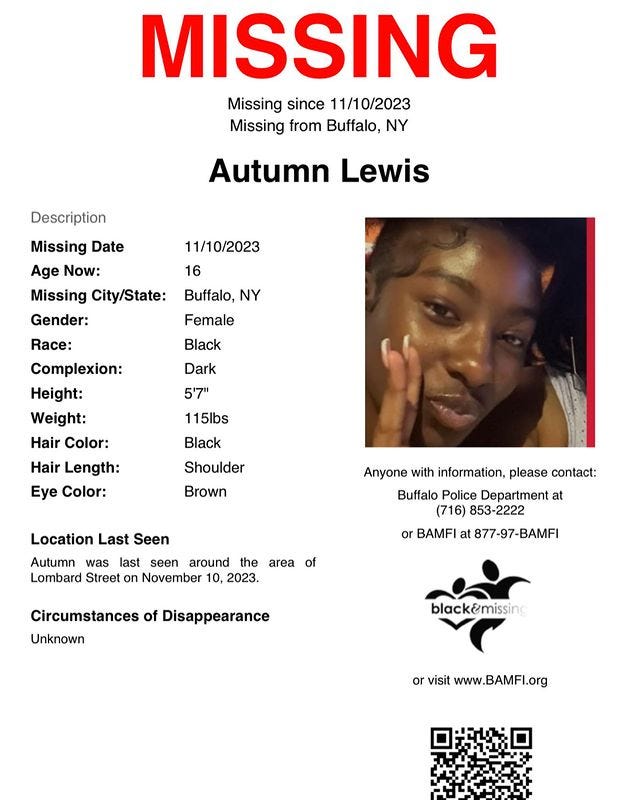Black women clinch historic abortion win, defend Angel Reese and Nia DaCosta, are flagged as "low performers"
Plus, an iconic Black Feminist artist, a lawyer aspiring for chess history, a government contractor turned first-gen farmer, Brazilian women leaders speaking out for Black Awareness Day & more.
THIS WEEK IN BLACK WOMEN NEWS
21 stories across global and national news, entertainment, sports, politics, agriculture, health, technology, music, and more.
The Black Women Who Fought for Ohio’s Historic Abortion Win
ELLE, Larada Lee-Wallace
“While big legacy organizations within the coalition were heavily involved in knocking on doors and ensuring voter turnout, it was the Ohio Women’s Alliance—one of the only Black-led organizations in OURR—that led a huge field program, reaching out to more than 1.3 million young, female, and BIPOC voters across the state.
And exit polls have shown those efforts were essential; when it came time, 60 percent of female voters, 83 percent of Black voters, and 77 percent of voters under 30 voted yes on the issue. A week after the win, Jordyn Close, deputy director of Ohio Women’s Alliance and a We Testify abortion storyteller, told ELLE.com that, to her, the exit polls make it clear: this moment wouldn’t have been possible without Black and brown advocates, organizers, and voters.”
RELATED:
“Ohio election results seen as major victory for Black women,” The Grio, April Ryan
Backlash to affirmative action hits pioneering maternal health program for Black women
KFF Health News, Ronnie Cohen
“But the future of the Abundant Birth Project is clouded by a lawsuit alleging that the program, the first of its kind in the nation, illegally discriminates by giving the stipend only to people of a specific race. The lawsuit also targets San Francisco guaranteed-income programs serving artists, transgender people and Black young adults.”
Meet the lawyer working to become the first Black female chess master
Today, Laura Jarrett
“When first-year corporate lawyer Rochelle Ballantyne is done working her day job, she’s focused on her goal of become the first Black female chess master. The game helped to put her on a successful path in life and now she’s taking her competition to the next level.”
Andscape roundtable: LSU, Angel Reese and Kim Mulkey. What is going on?
Andscape, Andscape Staff
“After Reese missed her second full game, Mulkey’s said in her press conference she was, “protecting her player.” Mulkey’s idea of “protection” has done everything but protect Reese.
One can only imagine the mental toll online rumors and abuses have had on Reese’s psyche this early in the season. Watching the world that once built you up as being a phenomenal player and the future of the sport to now watching them tease and mock you with allegations of terrible grades and being a backstabbing teammate probably has to hurt more than Reese will publicly admit. Amid the hate of the media storm, South Carolina guard and SEC rival Raven Johnson notably showed her support. Black women shouldn’t have to shoulder the burden alone of protecting Black female athletes.”
At Lululemon, Being Black Is ‘Off-Brand’
Business of Fashion, Sheena Butler-Young
“Dotson left the trip uneasy but said it was only the beginning of her challenges with the company. In February 2023, during Black History Month, she was put on a performance improvement plan, which hinged on accusations she was ‘unprofessional’ and ‘non-collaborative.’ Later that month, the brand unveiled a Black History Month campaign on Instagram, dubbed Take Space, prominently featuring Dotson, with the caption: ‘When we resist the pressure to shrink, we affirm ourselves and empower others.’ Dotson was let go in April.”
Betye Saar Reassembles the Lives of Black Women
The New Yorker, Hilton Als
“Saar uses prefabricated pieces (Black dolls, Aunt Jemima paraphernalia, advertising images, and the like) to show us how women of color have been repeatedly treated as props—accommodating, beneficent characters—in the never-ending drama of race. These images rarely even hint at an interior life, but Saar makes that interiority manifest. Her seminal work, ‘The Liberation of Aunt Jemima’ (1972)—which the activist Angela Davis reportedly credited with sparking the Black women’s movement—is a box containing a smiling Mammy figure with a gun under each arm, ready to blow all those stereotypes away.”
'Black Twitter' asks 'What if Sam Altman were a Black woman?' in the wake of ouster
Business Insider, Monica Melton and Aaron Mok

“The outpouring of support for Altman resounded across the tech industry. Black women's experiences in corporate America however, and an underrepresentation in fields like technology, have led some Black tech workers to believe there's a double standard in how the outside world reacts to the ousting of white founders compared to Black founders. […]
‘Unlike Atlman, Black women founders rarely enjoy such overwhelming support, and the road to recovery after setbacks can be exceptionally challenging,’ Bryant told TechCrunch's Dominic-Madori Davis in a blog post. ‘The absence of a Black or female counterpart for Altman in the tech industry reflects the persistent replication of the 'successful CEO' prototype, primarily shaped by the persona of the white male wonderboy.’”
RELATED:
“‘There was all sorts of toxic behaviour’: Timnit Gebru on her sacking by Google, AI’s dangers and big tech’s biases,” The Guardian, John Harris
“Tech Elite’s AI Ideologies Have Racist Foundations, Say AI Ethicists,” People of Color in Tech, Samara Linton
At Thanksgiving: The stories of Black female chefs in NOLA – and efforts to fight food insecurity
WWNO, Adam Vos and Alana Schreiber
“We also can’t talk about food without talking about food insecurity. While New Orleans is famous for its delicacies, food is not readily available to everyone, especially those living in parts of the city known as food deserts. But there are some organizations looking to change that, such as I Am New Orleans, which focuses on community-led efforts to improve racial equality in the city – including an urban farm geared towards youth development.”
This Black Woman-Owned Tea Brand That Supports Survivors Of Domestic Violence Is Now In Over 700 Grocery Stores
Blavity, Jahaura Michelle
“Crockett, a Chicago native and former health science professor, launched her tea brand to revitalize the health and wellness field. She witnessed several family members experiencing illnesses and decided to create Pennie’s Tea to offer flavorful loose-leaf teas and cold brew iced tea. […] In addition to her entrepreneurial success, Crockett is also a survivor of domestic violence, and she uses Pennie’s Tea to shed light on the growing number of women who are affected by it.”
Missing in Chicago
Invisible Institute, Trina Reynolds-Tyler & City Bureau, Sarah Conway

“A two-year investigation into how Chicago police handle missing person cases reveals the disproportionate impact on Black women and girls, how police have mistreated family members or delayed cases, and how poor police data is making the problem harder to solve.”
RELATED:
“Black Women’s Advocacy Paved the Way for Policies on Missing Black Women and Girls,” NPQ, Rebekah Barber
Black Women Hired Onto Whiter Teams Are More Likely To Get Flagged As 'Low Performers'
HuffPost, Monica Torres
“Although Asian and Latinx women and men in the study were also in the minority on their white-majority teams, Black women were the only demographic group to face significantly worse promotion and retention outcomes as a result of being placed on a whiter team. The study showed that when the share of white co-workers went up by 14 percentage points, that was associated with a 10.6 percentage-point increase in turnover for Black women.”
Amid The Marvels’ Box Office Failure, Black Women Will Defend Nia DaCosta At All Costs
The Root, Stephanie Holland
“On Monday, The Hollywood Reporter prominently featured an article with the headline, “Why ‘Marvels’ Director Nia DaCosta Bailed on the Cast-and-Crew Screening?” This obvious insult to the director sparked an outcry of criticism from Black women who thought the outlet was attacking DaCosta for something that is commonplace in the industry: Directors don’t regularly attend these screenings. And in this case, reports surfaced around social media that DaCosta wasn’t even invited. The only reason to try and make this a big deal is to hang an unwarranted ‘unprofessional’ label on her.”
RELATED:
“Nia DaCosta’s ‘The Marvels’ Is The Highest-Grossing Film Ever For A Black Woman Director,” Blavity, Monique Jones
Documents show the WHO paid sexual abuse victims in Congo $250 each
Associated Press, Maria Cheng
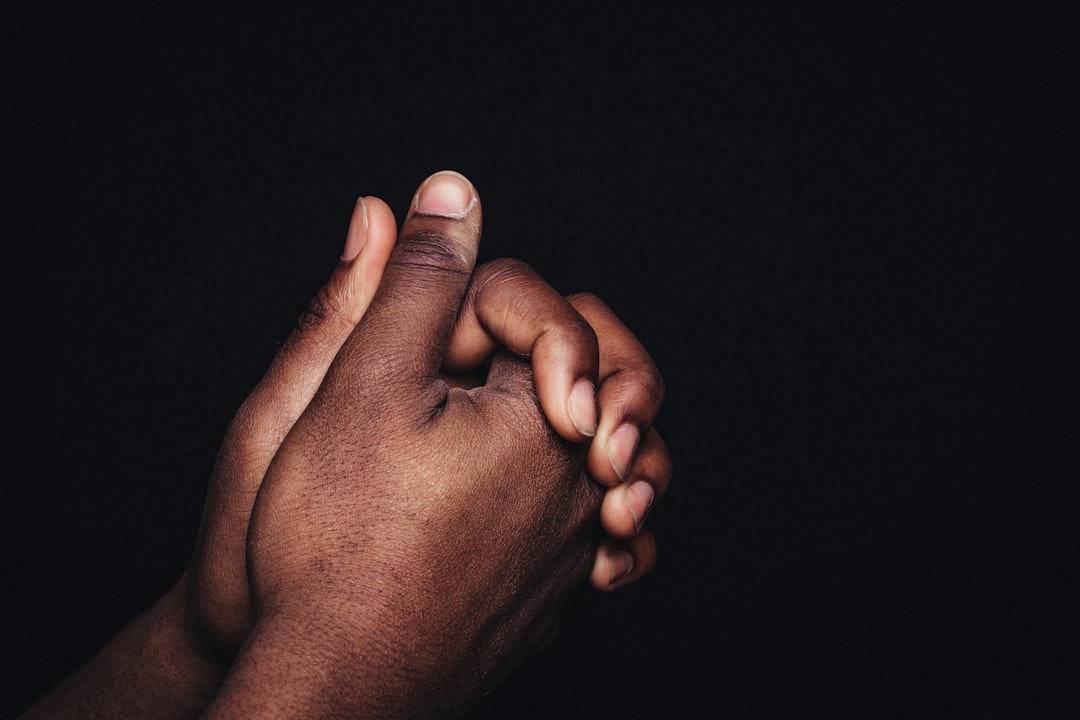
“The payments to women didn't come freely. To receive the cash, they were required to complete training courses intended to help them start “income-generating activities.” The payments appear to try to circumvent the U.N.'s stated policy that it doesn't pay reparations by including the money in what it calls a “complete package” of support.
Many Congolese women who were sexually abused have still received nothing. WHO said in a confidential document last month that about a third of the known victims were “impossible to locate.” The WHO said nearly a dozen women declined its offer. The total of $26,000 that WHO has provided to the victims equals about 1% of the $2 million, WHO-created “survivor assistance fund” for victims of sexual misconduct, primarily in Congo. In interviews, recipients told the AP the money they received was hardly enough, but they wanted justice even more.”
The Black Mambas: South Africa's all-female anti-poaching unit
BBC, Jeremy Riggall
“For many women from the local communities, employment opportunities are scarce. Becoming a Black Mamba has a wider impact, empowering women's social standing and gaining economic independence. The Black Mambas' ability to make a difference for local wildlife conservation also increases wider understanding of the issue. Mhlongo's friends are impressed by her ability to predict animal behaviour and stay safe. They see her as a role model and want to sign up.
‘Most people locally believe that these animals belong to white people,’ says Mhlongo. ‘We want to change that way of thinking, so that everyone in our community knows that this wildlife belongs to all of us.’”
Women with Black African ancestry ‘at greater risk when plague hit London’
The Guardian, Nicola Davis
“‘[The plague] is portrayed as being an indiscriminate killer, but we actually know it wasn’t,’ said Redfern. Previous studies have shown those who experienced poor nutrition in the famine that preceded the plague had a higher risk of dying from the disease.
Dr Onyeka Nubia, a historian at the University of Nottingham and author of Blackamoores, about Africans in Tudor England, said for some, it remains a challenge to accept that people of different ancestries and heritage were an established part of England’s past. ‘It is not a political matter. It’s not a matter of conjecture. It’s actually an evidential fact. England has been ethnically diverse for thousands of years,’ he said.”
‘This film is needed now more than ever’: exploring the roots of US racism
The Guardian, David Smith
“When it comes to talking heads, the usual suspects are out. Apart from Kendi himself, Stamped from the Beginning has an all-female line-up of Black academics and activists including Angela Davis, Honorée Fanonne Jeffers, Brittany Packnett Cunningham, Jennifer Morgan and Stephanie Jones-Rogers. […]
‘It was a very deliberate choice because when I got handed a list of academics and experts and historians, there were all the usual names on there that you always see. But I noticed the pattern that a lot of the work around racism was being done by Black women at Howard and Harvard and Princeton and Yale so I had the idea why don’t we only use Black women to tell this story? Black women were always the forefront of the resistance movement and, in my eyes, never get their due.’”
Overdose deaths have soared among pregnant people, study reveals
The Washington Post, Sabrina Malhi
“The data also show there has been a notable rise in overdose deaths among pregnant or postpartum Black women, paralleling the overall increase in maternal mortality rates among this demographic, noted study co-author Wilson Compton, deputy director of the National Institute on Drug Abuse.
Experts say the rise in overdose deaths in this group from 2018 to 2021 can be attributed to many external factors, including social isolation due to the coronavirus pandemic and lack of adequate prenatal and postpartum care in the United States.”
Fiber artist confronts racism through Black hair, unraveling flags and more
ARTS ATL, Angela Oliver
“Kinky hair is a constant throughout the exhibit, whether it’s balls of Clark’s hair arranged in the shape of the United States, works made with fine-toothed combs, a video of Black men reciting poetry in a barbershop or layers of hair that act as mortar between bricks stamped with the words of the Declaration of Independence.”
RELATED:
“Southfield art exhibit launches paying tribute to CROWN Act, Tignon Women,” CBS News, Luke Laster
“‘A Spectacular Black Girl Art Show' comes to Charlotte to highlight ‘an orchestra of creativity’,” WFAE, Elvis Menayese
“‘Throughline’ exhibit celebrates Oakland's Black women leaders with art, poetry, food + music,” 7x7, Shoshi Parks
Woman leaves her white-collar job to become first-generation farmer
WUSA via CNN Newsource
“Before she could clear the weeds of her property, she had to navigate a complicated land grant process that made little space for someone who looked like her. ‘Very minimal amount of Black farmers in the country right now,’ Livingstone said. ‘And it’s because of a lot of the injustices that were perpetrated by the USDA and many other local organizations, right? And so to me, if you want to correct those past wrongs, you get an application that says Black as the ethnic group. That application needs to be expedited.’
Livingstone said it’s important for Black women to learn how to farm. ‘Because it’s in our DNA, and because our ancestors were brought to this land for that primary function to cultivate the soil here. OK. It’s part of who we are,’ she said.”
On This Brazilian Black Awareness Day, Watch: ‘The Vision of Black Female State Deputies in Rio de Janeiro on Race, Gender, and Favelas’
RioOnWatch, Felipe Bellido
“On Brazilian Black Awareness Day, this mini-doc with English subtitles aims to be a historical document in which three Black women in leadership roles within the Rio de Janeiro State Legislative Assembly (ALERJ), reflect on race, class, gender, territory, and the legacy of Black women’s performance in Rio de Janeiro politics. They are state deputies Renata Souza (from Complexo da Maré), Dani Monteiro (from São Carlos), and the first transgender parliamentarian, Dani Balbi (from Engenho da Rainha).”
Tierra Whack’s Brave New World
Andscape, Shamira Ibrahim
“Cypher is a dramatic interrogation of Tierra’s journey from young freestyling phenom to bona fide star, striving to understand her relationship with celebrity and creative authenticity. It plays with various narrative devices, remixing the standard music documentary format by weaving fictional elements around true events. In one moment, you are watching the genius of Tierra Whack’s brain at work as she starts to mold the melody for “Peppers & Onions” with her engineer, the next, you watch the aftermath of her viral moment of slipping and falling while performing at the Red Bull Music Festival in Chicago in 2019, a moment that few artists would embrace.”
Have you seen these missing Black girls & women?
Please visit Black and Missing Foundation on Instagram to view these and other missing persons posters.


